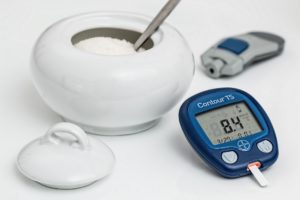 Diabetes is a health condition that causes complications throughout the body. According to the Centers for Disease Control and Prevention (CDC) National Diabetes Statistics Report, 30.3 million people have diabetes. That’s 9.4% of the U.S. population! November 14th is world Diabetes Day, and we thought what better time to discuss Diabetes and Dental Health?
Diabetes is a health condition that causes complications throughout the body. According to the Centers for Disease Control and Prevention (CDC) National Diabetes Statistics Report, 30.3 million people have diabetes. That’s 9.4% of the U.S. population! November 14th is world Diabetes Day, and we thought what better time to discuss Diabetes and Dental Health?
Did you know Diabetes affects your mouth?
Everyone has bacteria living in their mouth, however, when people with diabetes experience high glucose levels, the glucose causes those bacteria to thrive and exceed normal levels, exacerbating the risk for tooth decay, periodontal(gum) disease, saliva gland dysfunction, infection, delayed healing and more. And vice versa, gum disease can make it harder to control blood sugar – It is harder to control your blood sugar while your body is trying to fight an active infection.
Periodontal disease is the most common dental disease affecting those living with diabetes per the American Dental Association (ADA). Periodontal disease is a chronic inflammation of your gums. It’s caused by the buildup of plaque and tartar on your teeth. This buildup will cause the gums to pull away from the teeth forming pockets. These pockets attract harmful bacteria and can become infected causing chronic bad breath and permanent damage such as bone, tissue and tooth loss. Gum disease is treatable and even reversible when caught early.
We can offer these tips, in accordance with the ADA’s guidelines, to help you with your dental health:
- Control your blood sugar levels. Use your diabetes-related medications as directed, changing to a healthier diet and even exercising more can help. Good blood sugar control will also help your body fight any bacterial or fungal infections in your mouth and help relieve dry mouth caused by diabetes.
- Have exceptional home dental habits, to include twice daily bushing, flossing
- Visit your dentist regularly (at your recommended 3 month/6 month recall visit) and update them of your diabetic progress each visit.
- Watch for signs or symptoms of oral disease and report them to your dentist. These may include:
- Swollen gums, and/or gums that bleed easily
- Pus between the teeth when the gums are pressed
- Consistent bad breath or bad taste in the mouth
- A bite that feels different
- Thrush
- Poor healing
- Dry mouth
